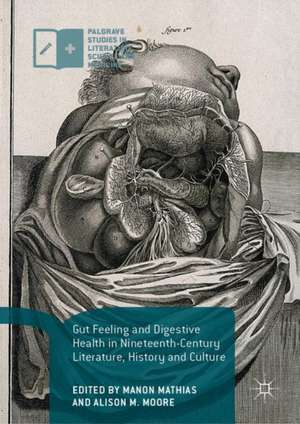Gut Feeling and Digestive Health in Nineteenth-Century Literature, History and Culture
Editat de Manon Mathias, Alison M. Mooreen Limba Engleză Paperback – 10 dec 2019
| Toate formatele și edițiile | Preț | Express |
|---|---|---|
| Paperback (1) | 778.76 lei 6-8 săpt. | |
| Springer – 10 dec 2019 | 778.76 lei 6-8 săpt. | |
| Hardback (1) | 783.98 lei 6-8 săpt. | |
| Springer International Publishing – 27 noi 2018 | 783.98 lei 6-8 săpt. |
Preț: 778.76 lei
Preț vechi: 949.71 lei
-18% Nou
Puncte Express: 1168
Preț estimativ în valută:
149.03€ • 161.83$ • 125.19£
149.03€ • 161.83$ • 125.19£
Carte tipărită la comandă
Livrare economică 23 aprilie-07 mai
Preluare comenzi: 021 569.72.76
Specificații
ISBN-13: 9783030404383
ISBN-10: 3030404382
Dimensiuni: 155 x 235 mm
Greutate: 0.35 kg
Ediția:1st ed. 2018
Editura: Springer
Colecția Palgrave Macmillan
Locul publicării:Cham, Switzerland
ISBN-10: 3030404382
Dimensiuni: 155 x 235 mm
Greutate: 0.35 kg
Ediția:1st ed. 2018
Editura: Springer
Colecția Palgrave Macmillan
Locul publicării:Cham, Switzerland
Cuprins
Chapter
1:
The
Gut
Feelings
of
Medical
Culture, Manon
Mathias
and
Alison
M.
Moore.-
Chapter
2:
The
Great
American
Evil—Indigestion:
Digestive
Health
and
Democratic
Politics
in
Walt
Whitman, Tripp
Rebrovick.-
Chapter
3:
The
"Second
Brain":
Dietetics
and
Ideology
in
Nineteenth-Century
France, Bertrand
Marquer.- Chapter
4:
Situating
the
Anal
Freud
in
Nineteenth-Century
Imaginaries
of
Excrement
and
Colonial
Primitivity, Alison
M.
Moore.- Chapter
5:
Food
for
Thought:
Consuming
and
Digesting
as
Political
Metaphor
in
French
Satirical
Prints, Dorothy
Johnson.- Chapter
6:
Being
“Hangry”:
Gastrointestinal
Health
and
Emotional
Wellbeing
in
Nineteenth-Century
English
Literature
and
Science, Emilie
Taylor-Brown.- Chapter
7:
Visceralism
and
the
Superior
Mind
in
French
Medicine
and
Literature,
1750–1850, Anne
Vila.- Chapter
8:
Digestion
and
Brain
Work
in
Zola
and
Huysmans, Manon
Mathias.- Chapter
9:
Textual
Ingestions
and
(In)digestions
in
Flaubert,
Zola
and
Huysmans, Larry
Duffy.- Chapter
10:
Hygiene,
Food
and
Digestion
in
Post-Unified
Italy:
Paolo
Mantegazza’s
Medicine
in
the
Kitchen
and
Beyond
(1861-1900), Cristiano
Turbil.- Chapter
11:
The
State
and
the
Stomach:
Feeding
the
Social
Organism
in
1830s
New
England, Molly
S.
Laas.- Chapter
12:
Food
Faiths:
Gut
Science
and
Spiritual
Eating, Catherine
L.
Newell.
Notă biografică
Manon
Mathiasis
Lecturer
in
French
at
the
University
of
Glasgow,
UK,
and
author
ofVision
in
the
Novels
of
George
Sand(2016).
Alison M. Mooreis Senior Lecturer in modern European history and Convenor of History research at Western Sydney University, Australia. She is author with Peter Cryle ofFrigidity, an Intellectual History(Palgrave, 2011), and author ofSexual Myths of Modernity: Sadism, masochism and historical teleology(2015).
Alison M. Mooreis Senior Lecturer in modern European history and Convenor of History research at Western Sydney University, Australia. She is author with Peter Cryle ofFrigidity, an Intellectual History(Palgrave, 2011), and author ofSexual Myths of Modernity: Sadism, masochism and historical teleology(2015).
Textul de pe ultima copertă
This
book
considers
the
historical
and
cultural
origins
of
the
gut-brain
relationship
now
evidenced
in
numerous
scientific
research
fields.
Bringing
together
eleven
scholars
with
wide
interdisciplinary
expertise,
the
volume
examines
literal
and
metaphorical
digestion
in
different
spheres
of
nineteenth-century
life.
Digestive
health
is
examined
in
three
sections
in
relation
to
science,
politics
and
literature
during
the
period,
focusing
on
Northern
America,
Europe
and
Australia.
Using
diverse
methodologies,
the
essays
demonstrate
that
the
long
nineteenth
century
was
an
important
moment
in
the
Western
understanding
and
perception
of
the
gastroenterological
system
and
its
relation
to
the
mind
in
the
sense
of
cognition,
mental
wellbeing,
and
the
emotions.
This
collection
explores
how
medical
breakthroughs
are
often
historically
preceded
by
intuitive
models
imagined
throughout
a
range
of
cultural
productions.
Caracteristici
Draws
together
the
medical
and
the
cultural,
highlighting
the
importance
of
emotion
in
gut
health
Opens
up
a
new
approach
to
corporeality
and
advances
the
study
of
digestive
health
Challenges existing literature on food which has focused on gastronomy
Challenges existing literature on food which has focused on gastronomy
